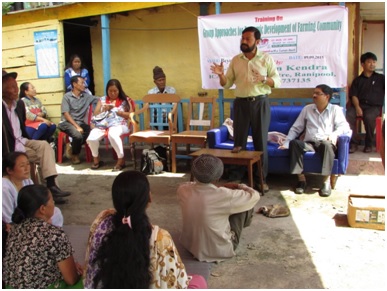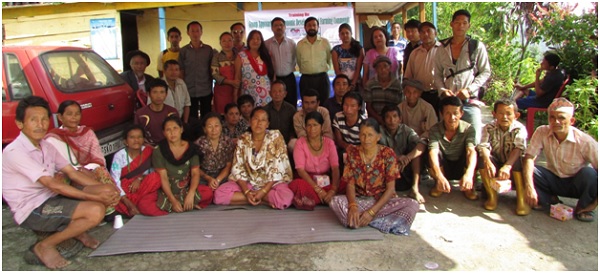ICAR- KVK empowered farm Women through group approaches
The main objective of this programme was to empower the rural resource poor farming community through group approaches. Group approach is a simple and farmer oriented participatory extension mechanism which will enable the government to reach large number of farmers to empower the small farmers with limited resources. The idea of Self Help Group is well known to everyone but in certain areas of Sikkim it is known but less understood concept among the farming community. ICAR KVK, East Sikkim, Ranipool took an initiative in this area and organized a meeting cum training on ‘Group approaches for Economic Development of Farming Community’ at Beyong village of Beyong - Phegyong GPU, East Sikkim. A total of 42 nos. of farmers and farm women attended the training programme. Dr.R. K.Avasthe, Joint Director, ICAR Sikkim Centre, Tadong called upon the farmers to work together by making small size SHGs. He stressed upon the role of the groups in removing poverty in the rural India today. He also highlighted that group-based model of self-help is widely practiced for rural development, poverty alleviation and empowerment of women. He expressed his views on a strategy for social development places emphasis on self-reliance, human agency and action for making farmers’ interest groups to mobilize people, to give them voice and build people’s organizations that will overcome barriers to participation and empowerment.
Dr. Raghavendra Singh, PC (I/c), KVK East Sikkim explained about the idea of self-help is the formation of groups, concept of a community and the development of egalitarian relationships that will promote people’s well being. He also added that SHGs serve as a medium of delivering micro credit to the members.
Miss Pallabi Phukan, SMS (Agril Extension) explained about the concept of Self Help Groups (SHGs), characteristics and functions along with stages of group formation. She encouraged the farmers to form new SHGs, CIGs, FIGs, Farmers’ Clubs etc. to improve economic condition through different income generating activities. Various rules and regulations of SHG for long term survival of the groups were also briefed by her.
Mrs. Anushree Gogoi, Programme Assistant (Home Science) explained about the relevance of group dynamics and its importance in the sustained functioning of SHGs. Citing examples of different SHGs in the state as well as other states, she detailed about the activities that can be taken up in groups for income generation with the use of locally available fruits and vegetables. Ms. Deepti Gazmer, ICAR-KVK coordinated and assisted for the smooth execution of the programme.
Sh. Boniface Lepcha, SMS (Horticulture), explained about the importance of value addition in horticultural crops through group approach. He also explained the post harvest technology of commercial horticultural crops of the locality.
The gathering was addressed by Shri Gaga Chettri, Supervisor; SIMFED threw some light on the programme to motivate farmers. He appraised the gathering that very few SHGs have been formed or are functioning in their GPU due to lack of awareness about the community groups. At the end of his deliberation, he praised the ICAR-KVK, East Sikkim for the efforts to improve the livelihood of rural farming of the state.
Shri Ongdi Sherpa, Horticulture Inspector, HCCDD, Govt. of Sikkim, briefed the gathering about the use organic horticultural technology as an income generating activity for SHGs for livelihood improvement.
The programme was also attended by Ms. Deepa Lepcha, Neena Giri, Gyani Maya and Greycila, ICS Field Functionaries, SIMFED. At the end of the program Ms. Deepa Lepcha proposed vote of thanks.

